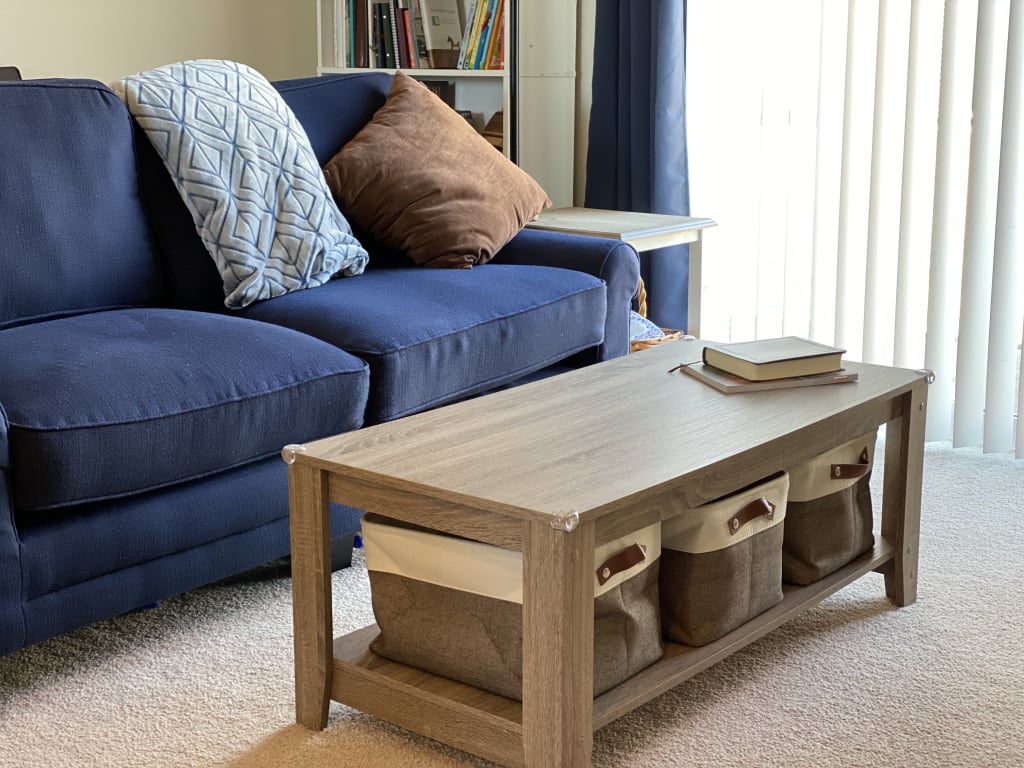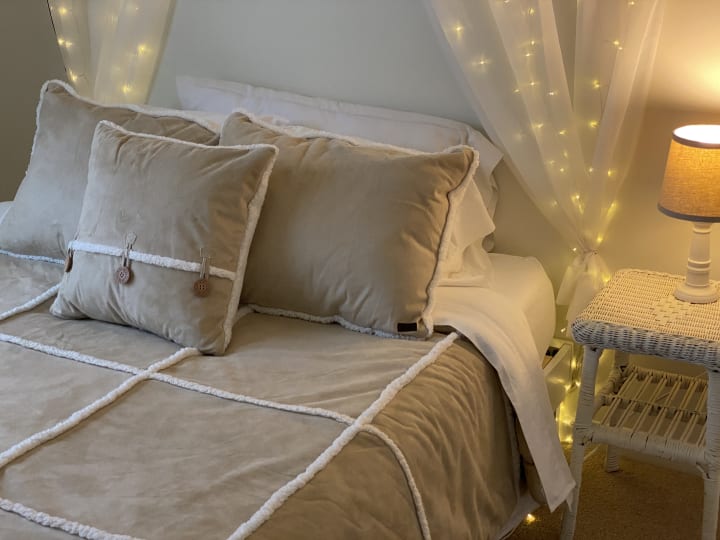Decluttering Habits for taking control of your life
My top 10 mindset tips for spring cleaning & decluttering

A true minimalist would probably say I’m not a minimalist—I think I’m just too sentimental! But I definitely subscribe to Gretchen Rubin’s idea of outer order, inner calm. The concept is fairly straightforward: a chaotic, messy environment makes you susceptible to a chaotic, stressed, restless, and worried mind. On the other hand, tidy, clutter-free surroundings make you feel calm and in control of your life and enable you to unlock your greatest potential for creativity, productivity, and positivity. Tackle these decluttering habits one at a time as you work towards taking control of your home and life.
#1: If it doesn’t spark joy, don’t keep it.

I just donated three trash bags of various items, and this was the primary standard I used to decide what to keep and what to discard. The concept is fairly popular among minimalists—it’s straight out of Marie Kondo’s The Life-Changing Magic of Tidying Up (or her TV series “Tidying Up,” on Netflix).
Of all my decluttering habits, this is both the simplest and the most difficult. “Does it spark joy?” can be a frustrating question if you over think it—so don’t. Define what this means for you, be honest with yourself, and don’t be overly legalistic. You can apply it differently to different categories of items, as I’ll explain further.
#2: Be willing to let go of some sentimental items, and tastefully display or consolidate the rest.

I’m a sucker for knick-knacks, souvenirs, and dainty, pretty things that hold sentimental value. I also hang on to a lot of greeting cards, wedding invitations, and sweet notes from special people. A true minimalist would probably say you don’t need these things—keep the memories, not the objects. I think if these things bring you joy, you should keep them!
However, if you have items from your past that you keep because you feel guilty getting rid of them… if you keep them boxed up and aren’t willing to use or display them in your home, it’s time to consider letting them go. Yes, this even applies to gifts. This particular category can be a tough one, but suffice it to say that you shouldn’t keep things just because you’ve always kept them.
#3: Don’t keep clothes you haven’t worn in a year.

The idealistic minimalist in me has occasionally gazed at my overstuffed closet and dreamed of creating a true capsule wardrobe. How nice would it be to have a simple, small collection of high-quality clothes for each season, have so much less laundry to wash, and not have to deliberate about what to wear every day? But the realistic (and sentimental) part of me just hasn’t gotten there yet. Still, I try to keep my closet cleaned out and organized, and part of that is being really honest with myself about what I really wear.
I recently set aside an afternoon to try on every single item of clothing in my closet. I sat my husband down and let him watch (finally, some decluttering habits he’ll get on board with!), and gave him full veto power over each outfit. The result was three more trash bags (in addition to the three I mentioned above!) filled with clothes that didn’t fit, didn’t suit my style, were deemed “frumpy,” or that my hubby or I just didn’t like. Now, my closet is no longer overflowing, I enjoy and feel good in every article of clothing that I own, and the daily “what to wear?” decision is that much simpler.
In one year, you’ve gone through all four seasons, so the one year rule allows for special things like Christmas sweaters—and it definitely accounts for all of your seasonal clothes. If there are things in your closet that you haven’t worn at all throughout the course of all four seasons, you should probably consider letting go of them. “Does it spark joy?” is definitely at play here—there’s no use hanging on to clothes that don’t fit, are worn out, or generally just don’t make you feel good!
Of course, things like weight loss and pregnancy are notable exceptions to this rule. Maternity clothes are a separate category, and obviously you should hang on to your pre-pregnancy clothes. If you’re losing weight and down-sizing your clothes, I don’t recommend hanging on to your old, bigger clothes just because you “might need them again someday”—or else you just might find your weight loss isn’t permanent!
#4: Don’t keep books you’ve never read and don’t intend to read.

My husband and I have a LOT of books, and we dream of one day having a real, bona-fide library in our home. So I usually do buy books rather than reading library books, and I’m not the type of person to say you only need to keep books you plan on re-reading.
However, I recently sorted through my books and donated a dozen or so that I picked up at thrift stores during college because they looked interesting, but that I haven’t read and honestly have no intention of reading. They were cluttering up my shelves and distracting me from the plenty of other books that I do intend to read! Plus, when it comes to decluttering, I enjoy having a little empty shelf space for a tasteful piece of decor; it creates a feeling of openness in the room when the bookshelves aren’t full to bursting.
#5: Give everything a home, and keep surfaces cleared off.

One of the biggest clutter culprits is random items that don’t belong anywhere—so they just hang out on the floor, the coffee table, the kitchen counter, or wherever. Designate a home for everything, and then commit to always putting it back in its home when you’re finished using it. As my mom always says… “a place for everything, and everything in its place!”
As with the bookshelves, having surfaces like the kitchen counter and table cleared off creates a sense of freedom and openness, and allows space for creativity. How can I start a new project or bake something delicious when my work spaces (and therefore my mind) are filled with random junk? Maybe it’s silly, but few day-to-day things bring me more peace of mind than having the kitchen counters completely cleared off (and wiped down) and everything put in its rightful place.
#6: Don’t store things on the floor.
I don’t just mean not throwing your clothes on the floor when you take them off—if you’re working on decluttering habits, things like that should be obvious. Look deeper: that stack of books on the floor by your bed that you’re “trying” to read? Keep them on the lower shelf of your night stand or designate a specific spot on a bookcase for “soon to read” books. The shoes scattered on the floor by the door? Get a shoe rack or create space in the bottom of a nearby closet. Even things that “belong” on the floor, like that basket of blankets or those decorative pillows, might be adding more to the clutter than you realize.
#7: Don’t leave dirty dishes until tomorrow… tomorrow will have dishes of its own.

I. Hate. Dishes. Doing the dishes isn’t the grossest chore in the world—I think the reason I hate it the most is simply because it’s the most persistent. You can put off cleaning the toilet, but the dishes pile up so fast you just can’t get around dealing with them. They’re also really obvious clutter—and that’s why I have a personal rule not to leave dishes for the next day. I may leave things until the end of the day, but the only thing grosser than today’s dishes is yesterday’s dishes. Waking up and stumbling into a messy kitchen just starts the day off on the wrong foot! This decluttering habit goes along with keeping surfaces cleared off, and it goes a long way towards starting each day off right.
#8: Make your bed.

There’s no easier way to immediately make a room look put-together than to make the bed! And a messy, unmade bed can make an otherwise tidy room look unkempt and messy. It takes about a minute and a half to make the bed… It’s such a simple decluttering habit to incorporate into your morning. Why not start your day by taking control of that one simple thing?
#9: Break the habit of impulse-buying.
Whether you’re shopping online or in a store, it’s way too easy to see something you like and buy it, whether you really need it or not. Wait a few days before you buy something, and if you find you still really want it or need it, go for it!
Apply the “does it spark joy?” question to items before you buy them. If this becomes one of your decluttering habits, you’ll save your future self from deciding whether to get rid of things.
#10: Don’t fall prey to the sunk cost fallacy.
In economics and business decision-making, a sunk cost is a cost that has already been incurred and can’t be recovered. The sunk cost fallacy is the mistake of making a decision based on a sunk cost.
So when we’re talking about building decluttering habits, you shouldn’t keep something just because you paid good money for it once upon a time. Whether it’s a food or drink item that you bought or made and won’t use, an article of clothing that’s outside the refund window, or any other purchase you can’t undo… if the only reason you haven’t thrown it out is because you don’t want to waste the money, please throw it out. You wasted the money when you bought it; don’t let it take up any more of your life by keeping it around.

A final note… don’t let yourself get overwhelmed. I think people often feel like decluttering and organizing is an all-or-nothing thing, but it isn’t! Just start by tackling one closet at a time, one room at a time, or one of these decluttering habits at a time. It’s a process, and that’s okay! Have grace for yourself and find satisfaction in each decluttering victory.
About the Creator
Ellen Short
I'm a Colorado native, foodie, crafty-creative type, and writer (obviously). I'm also the proud wife of a soldier and a work-at-home mama to a sweet baby girl.
Enjoyed the story? Support the Creator.
Subscribe for free to receive all their stories in your feed. You could also pledge your support or give them a one-off tip, letting them know you appreciate their work.






Comments
There are no comments for this story
Be the first to respond and start the conversation.